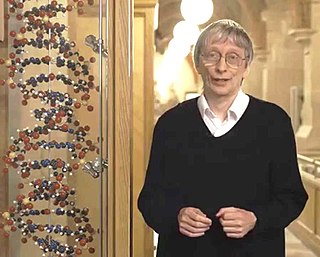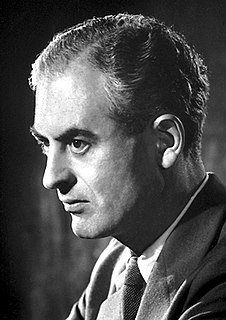A design is a plan or specification for the construction of an object or system or for the implementation of an activity or process, or the result of that plan or specification in the form of a prototype, product or process. The verb to design expresses the process of developing a design. In some cases, the direct construction of an object without an explicit prior plan may also be considered to be a design activity. The design usually has to satisfy certain goals and constraints, may take into account aesthetic, functional, economic, or socio-political considerations, and is expected to interact with a certain environment. Major examples of designs include architectural blueprints, engineering drawings, business processes, circuit diagrams, and sewing patterns.

Research is "creative and systematic work undertaken to increase the stock of knowledge, including knowledge of humans, culture and society, and the use of this stock of knowledge to devise new applications." It involves the collection, organization, and analysis of information to increase our understanding of a topic or issue. At a general level, research has three steps: 1. Pose a question. 2. Collect data to answer the question. 3. Present an answer to the question. This should be a familiar process. You engage in solving problems every day and you start with a question, collect some information, and then form an answer. Research is important for three reasons.1. Research adds to our knowledge: Adding to knowledge means that educators undertake research to contribute to existing information about issues 2.Research improves practice: Research is also important because it suggests improvements for practice. Armed with research results, teachers and other educators become more effective professionals. 3. Research informs policy debates: research also provides information to policy makers when they research and debate educational topics.

The scientific method is an empirical method of acquiring knowledge that has characterized the development of science since at least the 17th century. It involves careful observation, applying rigorous skepticism about what is observed, given that cognitive assumptions can distort how one interprets the observation. It involves formulating hypotheses, via induction, based on such observations; experimental and measurement-based testing of deductions drawn from the hypotheses; and refinement of the hypotheses based on the experimental findings. These are principles of the scientific method, as distinguished from a definitive series of steps applicable to all scientific enterprises.

An invention is a unique or novel device, method, composition or process. The invention process is a process within an overall engineering and product development process. It may be an improvement upon a machine or product or a new process for creating an object or a result. An invention that achieves a completely unique function or result may be a radical breakthrough. Such works are novel and not obvious to others skilled in the same field. An inventor may be taking a big step toward success or failure.

Creativity is a phenomenon whereby something new and somehow valuable is formed. The created item may be intangible or a physical object.

Sir Peter Brian Medawar was a British biologist and writer, whose works on graft rejection and the discovery of acquired immune tolerance were fundamental to the medical practice of tissue and organ transplants. For his scientific works he is regarded as the "father of transplantation". He is remembered for his wit both in person and in popular writings. Famous zoologists such as Richard Dawkins referred to him as "the wittiest of all scientific writers", and Stephen Jay Gould as "the cleverest man I have ever known".

A child prodigy is defined in psychology research literature as a person under the age of ten who produces meaningful output in some domain to the level of an adult expert.
Lateral thinking is a manner of solving problems using an indirect and creative approach via reasoning that is not immediately obvious. It involves ideas that may not be obtainable using only traditional step-by-step logic.
In physics or engineering education, a Fermi problem, Fermi quiz, Fermi question, Fermi estimate, or order estimation is an estimation problem designed to teach dimensional analysis or approximation of extreme scientific calculations, and such a problem is usually a back-of-the-envelope calculation. The estimation technique is named after physicist Enrico Fermi as he was known for his ability to make good approximate calculations with little or no actual data. Fermi problems typically involve making justified guesses about quantities and their variance or lower and upper bounds.
In scientific writing, IMRAD or IMRaD is a common organizational structure. IMRaD is the most prominent norm for the structure of a scientific journal article of the original research type.

In positive psychology, a flow state, also known colloquially as being inthe zone, is the mental state in which a person performing an activity is fully immersed in a feeling of energized focus, full involvement, and enjoyment in the process of the activity. In essence, flow is characterized by the complete absorption in what one does, and a resulting transformation in one's sense of time.
The creative industries refers to a range of economic activities which are concerned with the generation or exploitation of knowledge and information. They may variously also be referred to as the cultural industries (especially in Europe or the creative economy, and most recently they have been denominated as the Orange Economy in Latin America and the Caribbean.

Greatness is a concept of a state of superiority affecting a person or object in a particular place or area. Greatness can also be attributed to individuals who possess a natural ability to be better than all others. The concept carries the implication that the particular person or object, when compared to others of a similar type, has clear advantage over others. As a descriptive term it is most often applied to a person or their work, and may be qualified or unqualified. An example of an expression of the concept in a qualified sense would be "Abraham Lincoln is the definition of greatness" or "Franklin D. Roosevelt was one of the greatest wartime leaders". In the unqualified sense it might be stated "George Washington achieved greatness within his own lifetime", thus implying that "greatness" is a definite and identifiable quality. Application of the terms "great" and "greatness" is dependent on the perspective and subjective judgements of those who apply them. Whereas in some cases the perceived greatness of a person, place or object might be agreed upon by many, this is not necessarily the case, and the perception of greatness may be both fiercely contested and highly individual.
A progress trap is the condition human societies experience when, in pursuing progress through human ingenuity, they inadvertently introduce problems they do not have the resources or political will to solve, for fear of short-term losses in status, stability or quality of life. This prevents further progress and sometimes leads to societal collapse.

Fluid Concepts and Creative Analogies: Computer Models of the Fundamental Mechanisms of Thought is a 1995 book by Douglas Hofstadter and other members of the Fluid Analogies Research Group exploring the mechanisms of intelligence through computer modeling. It contends that the notions of analogy and fluidity are fundamental to explain how the human mind solves problems and to create computer programs that show intelligent behavior. It analyzes several computer programs that members of the group have created over the years to solve problems that require intelligence.
Computational creativity is a multidisciplinary endeavour that is located at the intersection of the fields of artificial intelligence, cognitive psychology, philosophy, and the arts.
Pattern-oriented modeling (POM) is an approach to bottom-up complex systems analysis that was developed to model complex ecological and agent-based systems. A goal of POM is to make ecological modeling more rigorous and comprehensive.

The eureka effect refers to the common human experience of suddenly understanding a previously incomprehensible problem or concept. Some research describes the Aha! effect as a memory advantage, but conflicting results exist as to where exactly it occurs in the brain, and it is difficult to predict under what circumstances one can predict an Aha! moment.
Convergent thinking is a term coined by Joy Paul Guilford as the opposite of divergent thinking. It generally means the ability to give the "correct" answer to standard questions that do not require significant creativity, for instance in most tasks in school and on standardized multiple-choice tests for intelligence.










